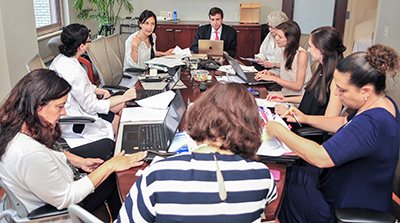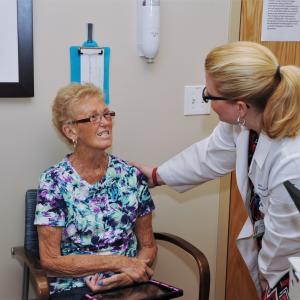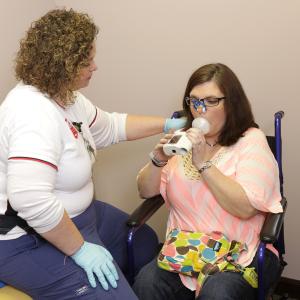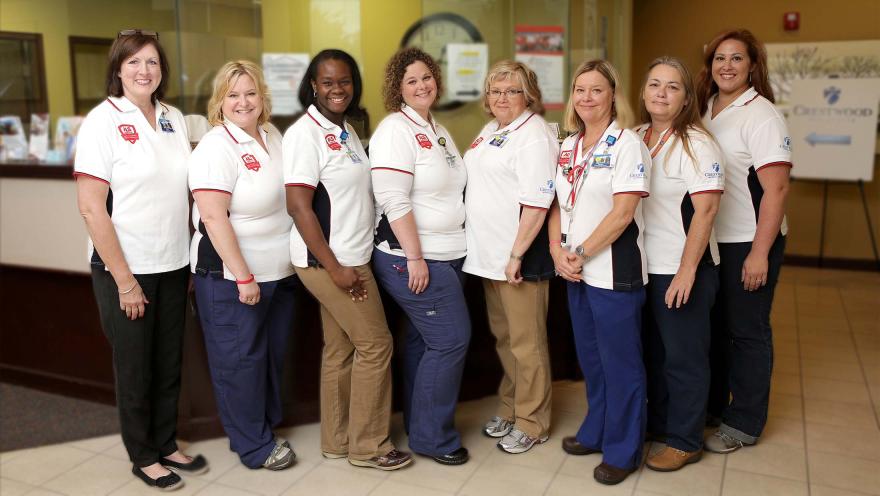This publication is the first of a four-part series shining a spotlight on ALS multidisciplinary care.
People diagnosed with ALS face a variety of challenges throughout their journey that can often become overwhelming, not just for the person diagnosed, but the entire family as well. ALS multidisciplinary clinics acknowledge the unique challenges ALS patients and their families face and work to provide the critical care and support they need to help extend survival and improve quality of life.
The multidisciplinary care model brings together a team of health care professionals specially trained to address the needs of people living with ALS, allowing them to receive care from each discipline they need during a single visit. The care team typically includes a neurologist, physical therapist, occupational therapist, respiratory therapist, nurse, dietitian, speech language pathologist, social worker, mental health professional and an ALS Association Chapter liaison.

As the disease progresses and new symptoms and difficulties arise, the number of people involved in the critical care increases as well. Clear communication among the care team and coordination of care and services becomes vital. The multidisciplinary team can help facilitate shared decision-making and the continuum of care along each unique journey.
The ALS Association collaborates with experienced ALS clinicians across the country to help ensure people living with ALS have access to this type of specialized care. The Association’s Certified Treatment Centers of Excellence and Recognized Treatment Centers and affiliated clinics provide compassionate care in a supportive, family-oriented atmosphere. “Multidisciplinary care is so key to the quality of life for people living with ALS and their families,” says Lori Banker-Horner, senior director of clinical programs at The ALS Association. In her role, Lori works with Association chapters and clinics around the country forming clinic relationships, guiding ALS clinics through the process toward certification or recognition, and sharing new ideas and best practices from clinic to clinic.

“The multidisciplinary clinic program is based on the American Academy of Neurology (AAN) practice parameters, which were established in the late 1990s,” says Lori. This type of team collaboration has been proven to extend life, helping people living with ALS maintain independence longer and enjoy improved quality of life when provided with options for symptom management, assistive technology, adaptive equipment, education, care services, and emotional support.
“Currently, in our clinic network within the U.S., we have 74 Certified Treatment Centers of Excellence and 21 Recognized Treatment Centers,” she says. “Of those 95 currently, there are nine at our Department of Veterans Affairs (VA) ALS clinics. So, we work very closely with the VA to serve our veterans with ALS as well.” Although the pandemic has provided barriers to the clinic certification program due to limited in-person visits and participation, several clinics are already in the queue and working through the process. “We always want to keep the highest level of integrity for the program,” said Lori.
But while the pandemic may have slowed the certification process of ALS clinics, it is helping to provide some benefits to patients and their families as well. Most clinics have turned to providing telehealth options for appointments opening greater access for patients with mobility issues and for those living in rural areas who previously couldn’t travel the distance to receive such care. “It was amazing to see how the clinics pivoted, even those without the infrastructure to do so, and really worked hard and were successful in providing telehealth,” she said. “I believe the majority of clinics that I've worked with feel that they're going to continue offering telehealth because it provides another option to ensure patients always have access to their ALS specialist and multidisciplinary team.”

The ALS Association is determined to make ALS a livable disease until a cure is found, and access to multidisciplinary care is key to making that a reality. “I'm just really pleased to see where we're going with the program and the opportunities that we have to really expand access to care, which is so important in increasing quality of life and extending life expectancy for our patients,” said Lori. “And that's key and that's our mission.”
To learn more about multidisciplinary ALS care and The Association’s Certified Treatment Centers of Excellence and Recognized Treatment Centers Program, visit our website HERE. To continue to learn more about the disease and follow stories about people living with ALS in the community, follow our blog at als.org/blog.
To hear more about multidisciplinary ALS care from Lori Banker-Horner, listen to her full interview HERE on Connecting ALS on January 6, 2022.


Comments
My husband recently diagnosed.
I am ready to hear back about my appointment at Duke ALS. I was confirmed it would be March and am anxious with my symptoms not being looked after since my diagnosis in October, 2021. Blessed to be here locally and wait with great hope to maintain my life and access.
I was initially mis-diagnosed with peripheral Neuropathy but after further investigation in 2020, ALS was confirmed. I have volunteered, postmortem, to donate my brain and spinal column to the VA Brain Bank to partially repay for what the ALS Association has made available to me
I was initially mis-diagnosed with Peripheral Neuropathy in2019. After further testing and investigation in 2020, ALS was confirmed. I have volunteered postmortem, to donate my brain and spine to the VA Brain Bank in pursuit of research and to partially repay the ALS Association for all they have made available to me.
I was diagnosed a year ago with bulbar ALS. I am currently doing a study through Mass General for the gene I have!
Join the conversation. Please comment below.